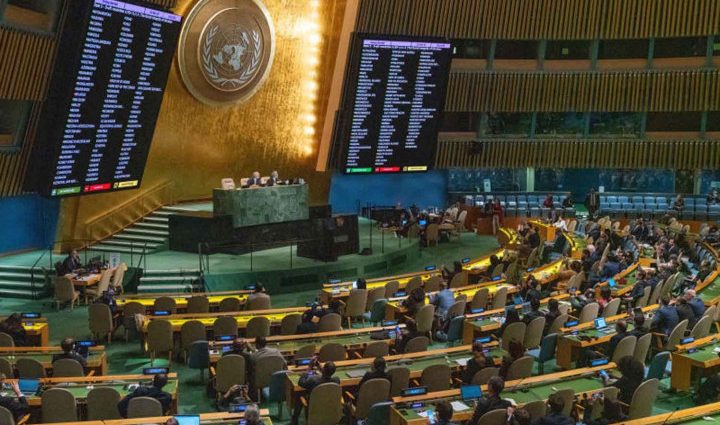Refuses to condemn Russian annexation

Thailand has abstained from a vote to condemn Russia’s annexation of four eastern regions of Ukraine, citing concerns that it would reduce the chances for diplomacy to bring about a negotiated solution to the crisis.
The kingdom was among 35 countries including China, India, Laos and Vietnam that abstained while 143 such as the US, Singapore, Cambodia, and the Philippines voted to condemn Russia’s incorporation of Donetsk, Kherson, Luhansk, and Zaporizhzhia into Russia.
Four countries — Syria, Nicaragua, North Korea and Belarus — rejected the resolution.
The vote on the resolution, which asked UN members not to recognise any of Russia’s annexation claims, came after Moscow used its veto power to prevent action at the United Nations Security Council.
The resolution also urged members to condemn President Vladimir Putin’s annexation and demanded Russia withdraw all troops from Ukrainian territory.
Suriya Chindawongse, ambassador and the permanent representative of Thailand to the United Nations, on Thursday explained the country’s decision.
He said Thailand holds international law and the UN Charter as sacred but chose to abstain because of the volatile and charged atmosphere.
He expressed concern that the resolution marginalises the chance for diplomacy to bring about a negotiated solution to the crisis and said it may put the world at risk of nuclear war and a collapse in the global economy.
The Thai diplomat cautioned against the politicisation of international principles which would undermine attempts to end the war.
He said Thailand was saddened by the physical, social and human destruction in Ukraine and it reiterated the need for all stakeholders to reduce conflict and violence while searching for peaceful solutions.
Thailand was among 58 countries that abstained from voting during a meeting of the United Nations General Assembly in April to suspend Russia from the UN Human Rights Council (UNHRC) over its conduct in Ukraine.
However, it was among 141 nations that voted for a UN resolution that condemned Russian “aggression against Ukraine” during an emergency meeting of the UN General Assembly at the UN’s New York headquarters in March.
Thailand was correct in abstaining, said Pongpon Chuencharoen, an independent academic of Russian studies. “As Thailand is also facing an energy crisis, I think … [this was] appropriate,” he said.
He said that with Thailand struggling with soaring energy costs and Mr Putin due to attend the Apec summit in Bangkok next month, the nation has a good opportunity to negotiate with Russia about energy supplies with a “friendship cost”.
“Even if we were talking about alternative clean energy like solar or wind power that leads to sustainable development, we need to realise that we cannot shift to alternative energy overnight,” he said.
“However, abstaining does not mean we agree with every Russian decision, including the ongoing violence in Ukraine. We still believe in the territorial integrity and sovereignty of Ukraine. Abstaining from the vote is, I think, the best solution to balance Thailand’s relations with the world and its national interests.”

